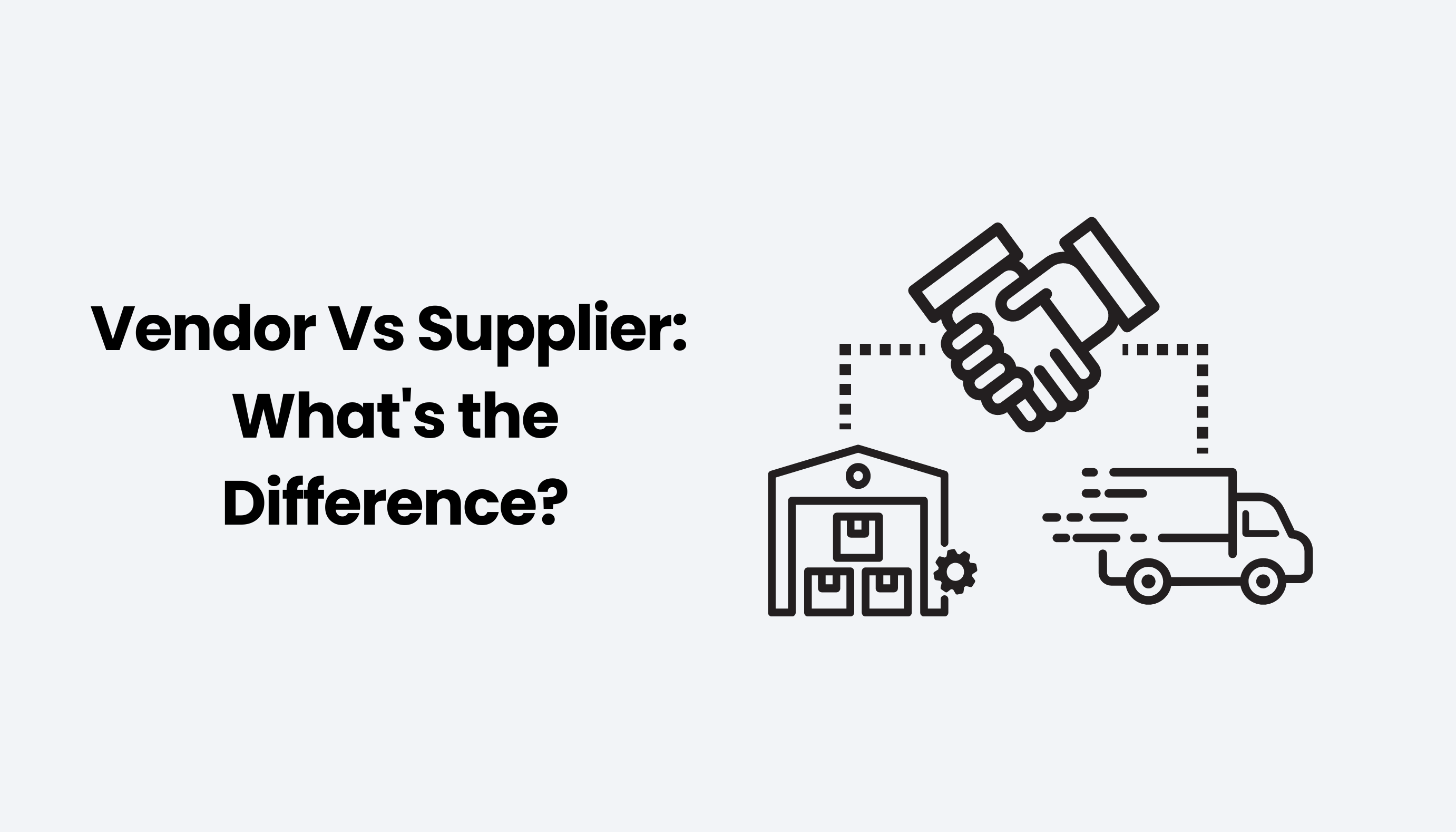Vendor Vs Supplier: What's the Difference?

Vendors and suppliers play important roles in any business ecosystem. Although the terms are often used interchangeably,, they refer to different entities in the supply chain, each with unique roles and relationships.
Knowing the difference will help you optimize your supply chain for improved business outcomes. This article will compare suppliers and vendors, explaining their key point of differences and how each operates.
Let’s get started.
Table of Contents:
- What is a Supplier?
- What is a Vendor?
- Vendor vs Supplier: Example
- Vendor vs Suppliers: Key Differences
- Final Thoughts
Jump to a section that interests you, or keep reading.
What is a Supplier?

A supplier is a person or company that sells raw materials or component parts of products to manufacturing businesses. Suppliers operate exclusively on a B2B (business-to-business) basis and form the initial link in the supply chain.
They supply the necessary materials for the production of finished goods. Sometimes, suppliers can be the producers of these materials themselves. They form the foundation of any manufacturing company by providing the bulk of the value required for production.
The procurement for suppliers focuses on factors like the quality, reliability, and cost of engaging in business with them. Manufacturing businesses place bulk orders with suppliers, and suppliers are responsible for ensuring the timely delivery of the required materials.
The relationship between suppliers and manufacturers tends to be long-term and is built on trust. Suppliers maintain B2B relationships with manufacturers by consistently providing quality products for efficient production and a competitive advantage in the marketplace.
The risk associated with suppliers is way more than vendors due to the larger quantities they handle. If an order is canceled at the last minute, suppliers will suffer significant financial losses. Therefore, managing and delivering bulk orders is critical to their success.
There are several types of suppliers, each catering to different aspects of the manufacturing and production process:
- Raw Material Suppliers: These suppliers provide raw materials, such as metals, plastics, and chemicals, needed for production.
- Component Suppliers: They supply the parts and components used in manufacturing finished goods.
- Packaging Suppliers: Offer packaging materials and solutions to ensure safe transport and presentation of products.
- Logistics Suppliers: Handle transportation and warehousing to ensure the timely delivery and storage of goods.
- Service Providers: Include managed IT services, quality management, and other operational support services needed for business operations.
What is a Vendor?

A vendor is an individual or business entity that sells finished goods directly to consumers or other businesses, bypassing intermediary distribution channels. As the last link in the supply chain, vendors deal directly with consumers. These goods can be products the vendor has manufactured themselves or products sourced from manufacturers or distributors, typically on a wholesale basis. Vendors operate on both B2B (business-to-business) and B2C (business-to-consumer) basis, offering products through online platforms, physical stores, or a combination of both.
Vendors handle smaller quantities of products compared to suppliers, which limits their financial risk if demand fluctuates. Their operations are often managed through warehouse or vendor management systems to ensure efficiency in inventory control and product delivery. Maintaining strong relationships on both sides of the business - B2B and B2C - is important for vendors, as these relationships drive business success and customer satisfaction.
For businesses, comparing prices across multiple vendors is a common practice. Vendors are selected based on the specific goods or services offered and the competitiveness of their pricing. Retail stores frequently maintain lists of trusted vendors who supply finished products. Third-party vendors also supply goods or services on behalf of another company.
The relationship with vendors is typically transactional, with businesses engaging them as needed.
Vendors fall into various categories, including:
- Manufacturing Vendors: Supply tools and machinery for production processes.
- Retail Vendors: Provide finished goods directly to retailers for consumer sales.
- Dropshipping Vendors: Manage inventory and ship products directly to customers without the retailer holding stock.
- IT Service Vendors: Offer managed IT services and technology solutions for business operations.
Vendor vs Supplier: Example
Let us take the example of Urban Eats, a popular restaurant that sources bread from a local bakery. In this case, the bakery acts as the vendor for Urban Eats as it supplies the restaurant with ready-to-eat bread for their meals. Urban Eats, in turn, serves this bread to its customers as part of its menu. Hence, Urban Eats itself is a vendor to its end customers.
Now imagine that Urban Eats experiences a sudden spike in demand for its sandwiches, quickly depleting its bread stock. To meet this increased demand, the restaurant places a large, urgent order with the bakery. In response, the bakery needs more flour to fulfill the order and contacts its flour supplier. Thanks to a strong, long-term relationship, the supplier promptly delivers the required amount of flour, using which the bakery produces more bread and meets Urban Eats' needs on time. This example highlights how suppliers play an important role in supporting production during unexpected demand surges.
However, the distinction between vendor and supplier can blur. For example, if the flour supplier that provides the raw flour to the bakery also sells pre-packaged flour directly to local grocery stores, then they take on the role of a vendor in that context.
Hence, whether a business is categorized as a vendor or supplier depends on the product’s use in the supply chain. If the product is a raw material used for further production, the business is acting as a supplier. If the product is a finished good sold to the end consumer, the business functions as a vendor.
Vendor vs Suppliers: Key Differences
| Vendor | Supplier | |
|---|---|---|
| Definition | Sells finished goods to consumers or businesses. | Provides raw materials or components to manufacturers. |
| Quantity of Product | Handles smaller quantities of goods. | Deals in large, bulk orders. |
| Objective | Sells finished goods to end users. | Supplies materials for production. |
| Business Relations | Operates in both B2B and B2C settings. | Works only in B2B, with manufacturers. |
| Relationship with Manufacturer | Indirect, transactional relationship. | Direct, long-term relationship. |
| Relationship with Consumer | Direct connection to end consumers. | No direct interaction with consumers. |
| Risk Involved | Lower risk with smaller quantities. | Higher risk with bulk orders. |
| Role in Supply Chain | Last step before reaching consumers. | First step in the supply chain. |
| Nature of Relationships | Transactional and flexible. | Long-term, strategic partnerships. |
| When to Work | For sourcing small quantities of finished goods. | For bulk materials for manufacturing. |
| Types of Goods | Deals with finished goods. | Supplies raw materials or components. |
The primary difference between a vendor and a supplier lies in the level of commitment they maintain in your business relationship.
Role in the Supply Chain

Suppliers are the first link in the supply chain. They provide the raw materials, components, or ingredients essential for manufacturers to create finished products. The entire network would collapse without the suppliers providing the raw materials. They do not interact directly with end users.
In contrast, vendors occupy the second-to-last position in the supply chain. They come into play right before the products reach the end users. Vendors source or curate products and services to meet marketplace demands. Unlike suppliers, vendors have a more direct interaction with the end consumers.
Nature of Business Relationships
Vendors have transactional relationships where the focus is on the immediate purchase and sale of goods. These relationships are typically flexible as businesses often switch vendors based on factors such as price, availability, and convenience. In vendor relationships, businesses prioritize product quality, availability, competitive pricing, and terms of sale, such as delivery times and payment conditions. This flexibility helps businesses to respond swiftly to market changes and shifting consumer demand to maintain a competitive advantage.
In contrast, suppliers engage in long-term, strategic relationships with businesses. They provide the essential raw materials or components necessary for uninterrupted production processes and for the delivery of high-quality outputs. The focus in supplier relationships is on the quality of the supplied materials, and the reliability and consistency of the supply.
These long-term partnerships often involve integrating suppliers into a company's production planning processes. Such collaboration helps in maintaining a steady supply of high-quality materials and even helps innovate and improve the overall production process. The strategic importance of suppliers ensures that their relationship with businesses goes beyond transactions, often involving a deep commitment to maintaining high production standards and operational efficiency.
When to Choose a Supplier vs. Vendor
Suppliers are the ideal choice for businesses that require bulk materials for manufacturing processes. Suppliers sell products in larger quantities for lower prices to manufacturers so that stay profitable after reselling produced goods. Suppliers typically deal with specific types of supply for businesses, and their input quality is crucial to the success of the final product. Businesses often work with multiple suppliers to secure various raw materials needed for the production of the final product.
In contrast, vendors are more appropriate when businesses need to source smaller quantities of finished goods for immediate use. Vendors supply a variety of products in limited amounts and less than what a supplier provides to manufacturers. Unlike suppliers, vendors don't specialize in a particular type of goods and can provide a range of finished products rather than raw materials.
Types of goods
Suppliers provide the raw materials or components necessary for the production process. These materials often require further processing to be transformed into finished products. Suppliers are primarily concerned with ensuring a continuous supply of these essential building blocks, which are important for manufacturers to produce their final goods.
On the other hand, vendors deal in finished goods that are ready for immediate use or resale. Unlike suppliers, vendors are more focused on meeting the needs of the end consumer, either directly or indirectly through other businesses. Vendors do not provide goods or services on a continuous basis as suppliers do.
Evaluation criteria
When evaluating vendors, the focus is on their ability to deliver specific products or services that meet business needs. Key criteria include:
- The quality, functionality, and suitability of the products they provide.
- Their ability to provide timely deliveries
- Their ability to provide competitive pricing while maintaining product quality.
- Vendors are expected to be reliable in fulfilling orders accurately so that business operations are not disrupted.
When evaluating suppliers, the focus shifts towards a more strategic and long-term partnership, where the relationship goes beyond just transactions. They are assessed based on their risk management ability, particularly how well they can mitigate supply chain disruptions to ensure the continuous supply of raw materials.
Final Thoughts
To improve supply chain management, businesses need to understand the differences between suppliers and vendors. Suppliers provide raw materials in bulk to other businesses, while vendors sell finished products to customers or other businesses.
Recognizing these differences helps organizations select the right supply chain strategies to keep goods moving smoothly from production to the end user.
Whether you're a supplier, vendor, or both, with Speedy Labs you have an easy-to-use platform for managing and tracking rebate agreements while building strong partnerships.
Interested in seeing how it works?
